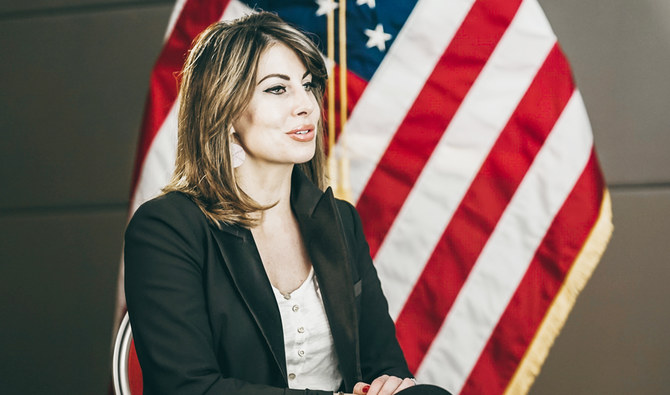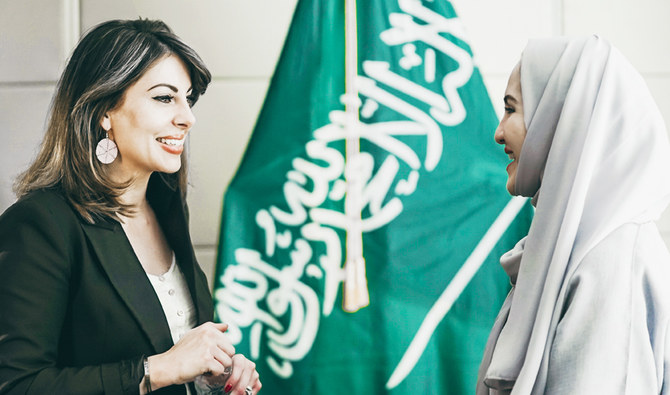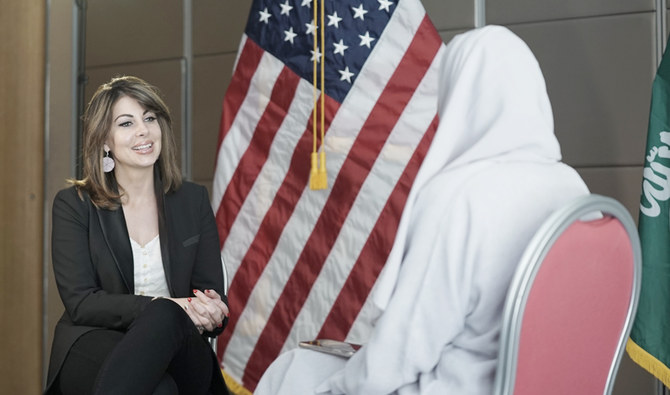RIYADH: The Saudi-US relationship has spanned 75 years and will last for another 75 years, US State Department spokesperson Morgan Ortagus told Arab News on a recent return visit to the Kingdom.
Ortagus was sent to Riyadh as deputy US Treasury attache in 2010 and lived in Saudi Arabia for almost two years.
“It’s funny what a difference 10 years makes. It doesn’t even seem like the same country,” she said.
One of the most striking changes is that women are no longer obliged to wear abayas, the Islamic loose-fitting, full-length garment. Ortagus said that she was about to pack her abaya for the tour but realized there was no need for it.
The significance of the changes is easily lost on those living outside the Kingdom, she said.
“I think that’s a story many Americans don’t see. If you had not lived here 10 years ago, 20 years ago, you wouldn’t understand it the way that those of us coming back do.”
Catching up with old friends has given Ortagus a wider perspective on the new Saudi Arabia. “I was reminded of this at dinner last night by a prominent Saudi woman, who is happy and proud of the reforms. She made the excellent point that Saudi women have been strong, capable and educated for a long time,” she said.
The woman told Ortagus that Saudi women want their peers in the US to understand them, not feel pity for them.
“Saudi women are not in need of being rescued,” Ortagus said, adding that American women also fought for decades to win the right to vote.
Growing through tough times
Reflecting on Saudi-US ties, Ortagus said: “We went through a really tough time in our relationship after 9/11. What eventually grew out of that was one of the most robust counterterrorism relationships in the world.”
The murder of journalist Jamal Khashoggi in October 2018 also led to tensions between the two countries.
However, “we haven’t shied away from talking about that and have continued to have a respectful dialogue on human rights,” she said.
Ortagus said that US President Donald Trump and Secretary of State Mike Pompeo both acknowledge the Kingdom’s sovereignty.
“We never come to a country and say, you must do things our way. We never come to preach that. We recognize that there are a lot of things that we also get wrong in the US. But we also recognize that when we see a problem, a challenge or an injustice, we try to confront it. We try to change. We try to constantly evolve as a society,” she said.
The future looks bright for both countries amid reforms that are strengthening established links, especially economically, Ortagus said.
She said that the US welcomes Saudi Arabia’s help on Mideast issues. “We’d love the Kingdom’s help on things like the Middle East peace plan and vision that Jared Kushner has laid out. It may not be a perfect plan, but if we’re ever going to have peace in this region, it’s going to come from Saudi getting in and being involved, helping us and helping everyone in this process.”
Evil regime in Iran
As Iran continues its malign attacks around the world, using its proxies to destabilize the region, Saudi-US relations have to remain strong in the face of the threat from Tehran, Ortagus said.
“They have shown that no matter what challenges are put in their path, they are going to fund terrorism and continue their ballistic missile program.”
The US is familiar with Iran’s behavior, she said, adding: “We know the regime wants to destabilize Saudi Arabia and its neighbors. We are very aware of that.”
The Trump administration is the first since President Reagan’s administration three decades ago to stand forcefully against the Iranian regime.
She added that this is the first time in decades that the regime in Iran has been told no. “They’re not going to behave in ways that will destabilize the region, and threaten the US and its allies,” she said.
Commenting on joint security and the fight against terrorism, she said that the Kingdom remains the most important US ally in the “maximum pressure campaign against the regime in Iran.”





































